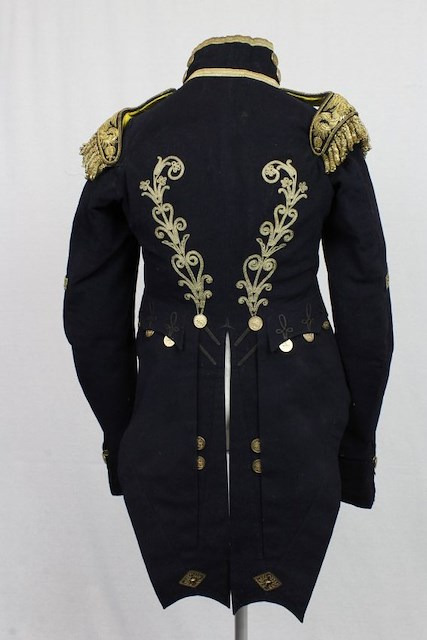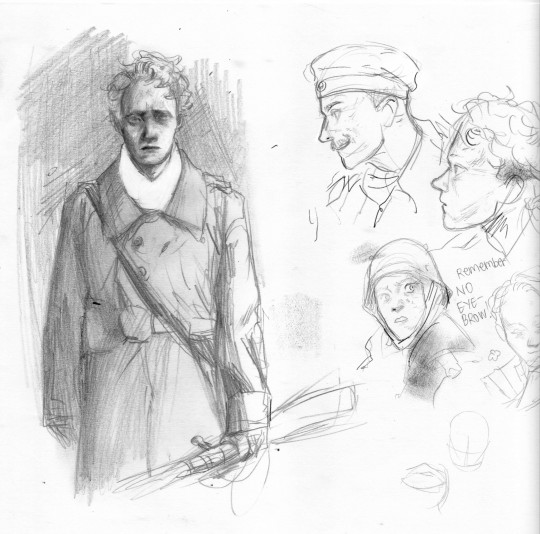oil joy joy oil joy boy train la jeep ma la train eye jump
Don't wanna be here? Send us removal request.
Text

5. Mädchen, ich liebe dich, Heiraten aber kann ich dich nicht; |: Wart nur noch ein Jahr, Dann wird's werden wahr,:| |: Daß wir werden ein Paar! :|
3 notes
·
View notes
Text
Theories on Eugene Allerton’s broken rib and its significance and symbolism in Queer.

For viewers of the film and readers of the novel “Queer,” we know that Eugene tells Lee that he has a rib that’s broken and hasn’t quite healed.
It is never explicitly explained how Eugene obtained this broken rib. As @greeneugene77 pointed out, we see him scratching at the area constantly which is a sign that it is mending (such a beautiful nuance to the performance by Drew Starkey!)
The book does not explain it and neither does the film as to how the rib became broken.
I even double-checked myself through a search:
“Information about how Eugene Allerton specifically broke his rib is not detailed in the provided search results.
However, the sources consistently mention that Allerton has a broken rib, which becomes a point of focus and fascination for Lee throughout the story. Several articles describe moments where Lee touches or caresses the area of the broken rib, highlighting its significance within their relationship and the film's themes.“ (Google)
I have a few theories based on Eugene’s reactions and his personality/insecurities.

The first is that it happened during the war. If he was working with informants and prisoners of war, it’s highly likely it happened from a skirmish with one of them that was resisting interrogation. I don’t see Eugene as violent (though he does shove Lee), but I do think he was forced to hold his own in the military, especially during a time of conflict.
It could have also been the result of a field battle, but not from a gunshot, as we don’t see any additional scarring.
The second theory is that it’s just an injury from clumsiness or even youth, but this seems unlikely because the man moves with the poise and grace of a ballerina.

My third theory is a bit darker and one that may explain his reluctance to accept his queerness. My thoughts led me to the question: What if it was the result of some type of hate related crime? Maybe a situation of being in the wrong place at the wrong time but we know that Eugene hasn’t been too adventurous in the places he ventures to (the reference about the queer clubs and the “kicks” comments). So I doubt he intentionally put himself in harms way. But what if he was perceived as partly not being hetero-masculine “enough?” He’s from the south, likely evangelical given the time period, young, beautiful and may have been perceived as too soft as was the case for many men of the era. The only thing that led me to this theory is one, his concern that Lee is going to run his hand down his ribs (though he is also put out with Lee’s constant pawing), and two, his tearful reaction (in the film) to discovering his deep connection and love for another man. If he’d experienced any type of hate, and given his 1930-1950’s upbringing in the American south, he would not only feel deep shame but possibly have been a target for his inclinations.

Google did however also provide some additional insight to the symbolism of the broken rib:
The broken rib is presented as:
A physical manifestation of Allerton's "castrated, or incomplete, self," according to one interpretation of the film.
An "obsessive part for Lee".
Perhaps a "defect in his armor," suggesting vulnerability or a point of access to his emotional inner self.

While the cause of the broken rib remains unspecified, its presence is a significant element in the narrative, particularly in how it influences Lee's feelings and perceptions of Allerton.

If this is in fact the case, then Gene’s scratching at his unhealed broken rib could also represent a constant need to scratch another itch getting under his skin: Lee.

These are only my musings and thoughts. Please feel free to comment if you’ve watched the film or read the book.
Thank you @dragonsareawesome123 for giving me permission to use the gifs you created!
22 notes
·
View notes
Text
well countryhuman GE and Prussia cause im so done




19 notes
·
View notes
Text
The German Army in World War I








During World War I, the German Army—formally known as the Deutsches Heer—entered the conflict as one of the most modern and disciplined forces in Europe. Germany’s military strategy at the war’s outset was built around the Schlieffen Plan, crafted by General Alfred von Schlieffen in 1905. The plan aimed to prevent a two-front war by quickly defeating France in the west through a massive flanking movement that would sweep through neutral Belgium and encircle Paris, before turning to face Russia in the east, whose mobilization was expected to be slower. However, the execution of the plan was flawed. Belgium's resistance, British involvement after the violation of Belgian neutrality, and unexpectedly rapid Russian mobilization forced Germany to divert troops eastward, contributing to the failure of the plan and the start of prolonged trench warfare on both fronts.
German soldiers, referred to as Landser, began the war wearing traditional uniforms that reflected 19th-century styles. Their standard issue included the feldgrau (field-grey) wool tunic and trousers, which were initially intended to offer some degree of camouflage. A distinctive feature of the early war uniform was the Pickelhaube, a leather spiked helmet with brass fittings, designed more for parade than protection. As the war dragged on and conditions in the trenches grew more brutal, the impractical Pickelhaube was gradually replaced by the Stahlhelm—a steel helmet introduced in 1916 that provided much better protection against shrapnel and bullets. Uniforms also evolved, with simplified designs, sturdier fabrics, and better-suited gear for mud, cold, and constant shellfire. Soldiers carried basic equipment including a rifle (often the Mauser Gewehr 98), ammunition pouches, an entrenching tool, and a gas mask as chemical warfare became more common. The German Army's early confidence gave way to a grinding war of attrition, where adaptability, endurance, and industrial support became just as crucial as initial planning.
From "The German Army in World War I"
96 notes
·
View notes
Text
lmao "At this time, [Frederick William I], who was looking all over Europe for giants for his guard, had sent officers to Paris to procure these colossi ... the lieutenant of police, surely happy to rid not only the capital, but France, of pests, was glad to help with the operation. We find the first proof of this in the file of a certain Michaux. The police officers Haymier and La Janière had reproached him for his connections with certain well-known sodomites such as the chevalier Féraud and the abbé Desonfontaines ... Michaux was authorised to work for the King of Prussia, and he was not the only one. Why then did the lieutenant of police stop this system? It certainly was to France's benefit, and who better could have appreciated it more later on than the future King of Prussia, the great Frederick, to whom Voltaire, doubtless very well-informed, unkindly bestowed the nickname of 'Seigneur Luc'"
13 notes
·
View notes
Text
none of you are prepared for this 1830 artillery officer's coat I found in the fort ti archives


I was like oh that's pretty, I like the lacing on the sleeves— OHHHH


THE CUNT!!! THE CUNT!!!!!
god DAMN I cannot imagine the price tag on this thing. all that gold lace on the front combined with the elaborate pattern on the back PLUS the giant ass fucking epaulettes. it's a rich man's coat if I've ever seen one but damn me if it doesn't go hard as hell.
970 notes
·
View notes
Text
Some sketches (And failed drawings) of Paul Baumer from '' All Quiet on the Western front ''




97 notes
·
View notes
Text


A Lone Child, gouache & edited in csp.
2nd pic is the pencil sketch to figure out the values. The stark feeling of loneliness in the third act is going to be stuck in my head for a while. Even before [redacted] died, seeing Paul looked so lost between cheering soldiers hurt my heart. He just doesn't want to be alone man
356 notes
·
View notes
Text
Random facts #2
Wilhelm I. had survived two assassination attempts in the span of 4 weeks. Wilhelm, at the time 81, liked to ride in his open carriage to greet the people. The first attempt was two pistol shots, but none actually hit their target, and the guy was directly arrested by a civilian and a bodyguard. But the second attempt by another guy did hit, and Wilhelm survived because he was wearing a helmet and a thick uniform coat due to the weather. He was shot by a shotgun and was hit on his forehead, back and right arm. Wilhlems words upon this attack apparently were: 'I don't understand why I'm always getting shot at.' ("Ich begreife nicht, warum immer auf mich geschossen wird.")
9 notes
·
View notes
Text
playing this one recently


i kinda like him tho i got why did they kick him out
10 notes
·
View notes
Text
was cleaning my camera roll out & found this 😭
i used a template & the captions annoy me so much 😣😣
56 notes
·
View notes
Text
Prussia Fact #14
When Frederick II was still a young kid he had quite long blond curls and was very proud of them - unfortunately for him his father, Frederick William I, preferred a short military haircut for his son and demanded for his hair to be cut off. If your daddy is the king what can you do. Nevertheless the young prince started crying the moment the hairdresser wanted to start his work, so that the man took pity on the boy. The poor fellow who just made a poor little boy with impeccable golden curls cry started getting into a lengthy explanation about how exactly he was going cut the boys hair and how he was going to style it etc. He made that explanation so boring that the king finally left the room because he just couldn’t deal with all that talk about hair anymore. With the father gone the hairdresser only cut of as little as possible so that the boy still had some of his curls left but that the whole thing had a chance of passing as a military haircut. Much later Frederick rewarded the man for being so considerate of his tears.
196 notes
·
View notes
Text
“When Frederick William discovered about the presents his son had given the Doris Ritter, he suspected that he must have slept with her. He ordered that the girl be examined by a midwife and a doctor to determine whether she were still a virgin. Perhaps she was not, or possibly Frederick William discovered something damning about her morals. Whatever he learnt, the king’s next move was astonishingly brutal. He ordered that she should be whipped through the streets of Potsdam by the common hangman and then thrown into the spin-house in Spandau for the rest of her born days.”
— Frederick the Great by Giles MacDonogh
1 note
·
View note






